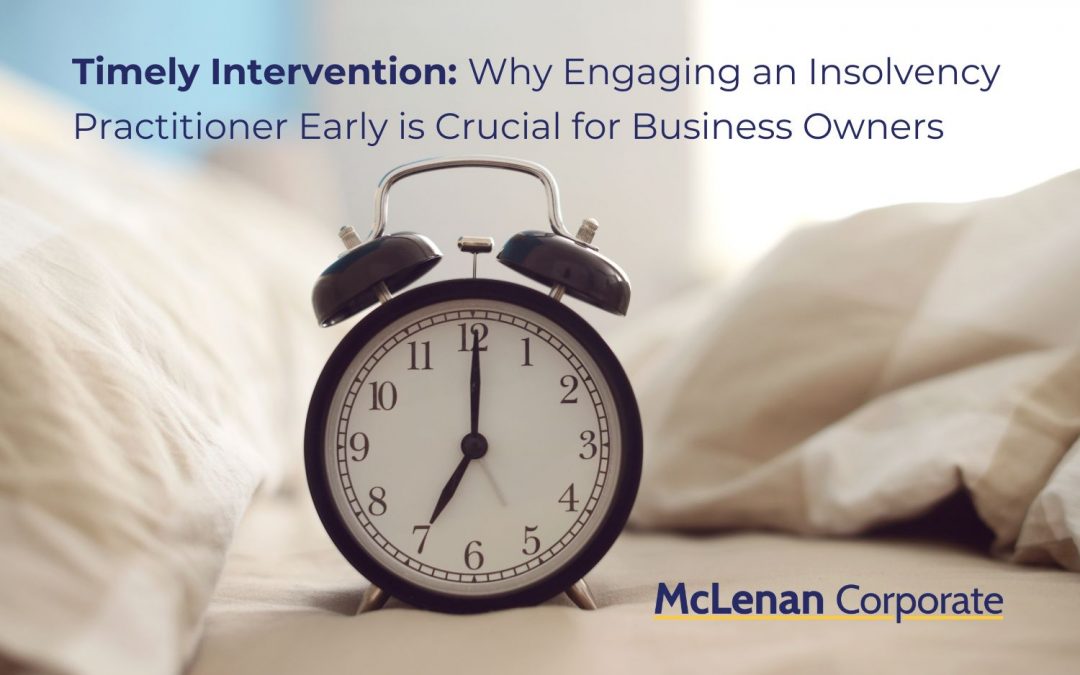Timely Intervention: Why Engaging an Insolvency Practitioner Early is Crucial for Business Owners
In the complex landscape of business finance, the role of an Insolvency Practitioner (IP) is often misunderstood and the value they may add underestimated. Many business owners, grappling with financial challenges, might consider approaching an IP as a last resort – typically when they’ve exhausted other options or when there’s little to no cash left in the business. However, this article aims to elucidate why engaging an IP early, especially before making significant debt payments, can be a pivotal decision in navigating financial turbulence effectively.
Early Engagement: A Proactive Approach to Financial Distress
The key to managing financial difficulties effectively lies in proactive action. Often, business owners delay seeking advice from an Insolvency Practitioner until it’s too late, by which time the options available may be severely limited. Engaging an Insolvency Practitioner while the business is still trading and has cash reserves can open up a range of possibilities for recovery or structured closure.
Understanding the Insolvency Landscape
Insolvency doesn’t necessarily mean the immediate cessation of business operations. Insolvency Practitioners are equipped to offer tailored solutions that align with Scottish insolvency legislation, which could include turnaround strategies, restructuring plans, or more formal insolvency procedures like Company Voluntary Arrangements (CVAs).
Strategic Allocation of Limited Resources
When cash flow is tight, every decision about where to allocate funds becomes critical. Insolvency Practitioners can provide strategic advice on which debts should be prioritised to keep the business afloat and mitigate risks. This prioritisation is essential to not only avoid exacerbating the financial situation but also to avoid breaching the pari passu principle in the onset of insolvency.
The Risk of Wrongful Trading
Wrongful trading occurs when directors continue trading when they knew, or ought to have known that there was no reasonable prospect of avoiding insolvent liquidation. Continuing to trade in such circumstances can lead to accusations of wrongful trading. If directors are found guilty of wrongful trading, they can be held personally liable for the company’s debts from the point they knew the Company was insolvent. In some cases they may also be disqualified from being a director, fined or even imprisoned. An early consultation with an Insolvency Practitioner is essential to help directors understand their responsibilities and avoid legal pitfalls.
Maximising the Potential for Business Rescue
Approaching an Insolvency Practitioner early enhances the chances of a successful business rescue. This could involve exploring avenues for refinancing, entering into informal arrangements with creditors, entering a Company Voluntary Arrangement or Administration. Insolvency Practitioners bring a wealth of experience and can often spot opportunities that business owners may overlook.
Protecting Personal Assets
For many business owners, especially in smaller enterprises, personal finances are often closely tied to the business. Early intervention by an Insolvency Practitioner can help in providing solutions that protect personal assets as much as possible, within the legal framework.
Managing Creditor Relationships
Insolvency Practitioners are adept at negotiating with creditors. By engaging an IP early, business owners can benefit from structured communication with creditors, potentially securing more favourable terms or agreements that allow for business continuity.
Avoiding Hasty Asset Liquidation
In desperation, business owners might liquidate assets quickly to pay off debts, often at a fraction of their value. If such transactions are entered into and the company later becomes insolvent it can result in serious repercussions for Directors who may be viewed as deliberately diverting assets away from creditors. An Insolvency Practitioner can guide on the appropriate timing and method for asset liquidation to ensure maximum return and avoid the necessity for transactions to be reversed if the company enters insolvency.
Reducing the Emotional Toll
Facing financial difficulties can be incredibly stressful. Insolvency Practitioners not only provide practical advice which can help avoid personal liability and protect assets but they can analyse the situation without any emotional attachment and provide clear headed solutions that may not be apparent to a distressed party, allowing business owners to focus on running the business or planning their next steps with clarity.
Preparing for a Structured Closure
If rescue or recovery is not feasible, an Insolvency Practitioner can assist in planning a structured closure that minimises financial loss and legal repercussions. This approach can feel very unsettling but making time to do this where appropriate ensures a more dignified and strategic winding down of affairs and can create a mutually supportive environment.
Conclusion
In conclusion, seeking the advice of an Insolvency Practitioner should not be viewed as an admission of defeat but as a strategic move to manage financial challenges effectively.
Insolvency laws provide various avenues for addressing financial distress, engaging an Insolvency Practitioner early can be the difference between a managed resolution and a crisis. For business owners navigating the stormy seas of financial difficulty, an IP can serve as an invaluable guide, offering expertise, options, and a clearer path forward.

